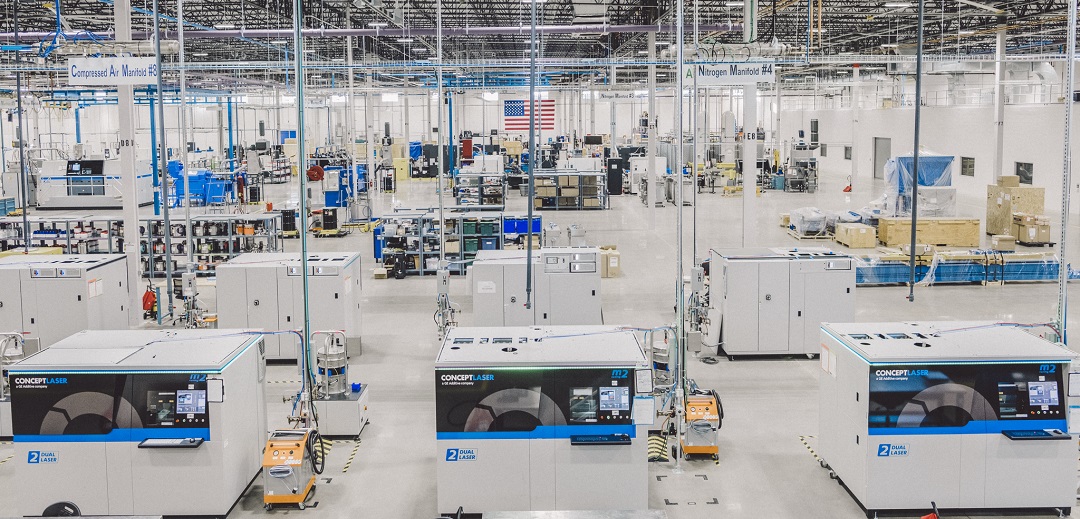GE Additive Pittsburgh was officially certified by American Systems Registrar (ASR) for “The Production of Additively Manufactured (3D Printed) Metallic Parts.”
We caught up with Brian Boyle, leader of the GE Additive Print Services business to find out more about the process and what this means for GE Additive.
Getting AS9100D and ISO9001:2015 certification is a great milestone, but the process takes time, doesn’t it?
It does and for good reason, to ensure all portions of the standard are in place. Over the past six months, the GE Additive Print Services team in Pittsburgh site has worked tirelessly to establish a Quality Management System (QMS) and has undergone multiple audits and process improvements to demonstrate adherence to the AS9100D (Rev D) and ISO 9001:2015 (Rev 2015) quality standard.
After four and a half days with the certifying agent, American Systems Registrar, and the creation of over 165 new operating procedures, including training for the entire team, late last month, GE Additive Pittsburgh was officially granted certification.This is a huge accomplishment that the entire Pittsburgh team can be very proud of, especially my colleagues Michelle Merwin, Catlin VanKley and Taylor Valone who were a driving force behind this achievement.
We are one of only a handful of additive part manufacturers worldwide with this certification. This is truly a competitive advantage which we can offer to our customers. However, as I have said to the team, this is just the start of our journey, as the standard requires continuous improvement around Key Performance Indicators (KPIs) and Quality Objectives.
How does this certification specifically apply to the additive industry?
The AS9100 certification is based on an international standard published by the Society of Automotive Engineers (SAE) titled "Quality Management Systems - Requirements for Aviation, Space and Defense Organizations.”
AS9100 is a widely adopted standardized quality management system for the aerospace industry that was established ten years ago by the Society of Automotive Engineers and the European Association of Aerospace Industries.
It offers a set of guidelines that focus on product safety and continuous improvement in effort to satisfy US Department of Defense, NASA, FAA and other aerospace applicable statutory and regulatory requirements. The standard drives manufacturing rigor and discipline to deliver safe and reliable parts with a repeatable process to our customers.
When you receive the more difficult AS9100 certification, you also receive ISO 9001 certification. Very simply put, ISO 9001 is the industry accepted supplier quality system that applies to all types of manufacturing for all types of non-aerospace products. The difference is that the AS9100 certification has a very specific set of product safety elements, including over 100 additional requirements to the ISO 9001 standard that apply specifically to the aerospace industry.
What does it mean day to day for GE Additive Pittsburgh and for our customers?
This certification along with the ISO certification allows GE Additive Pittsburgh to print parts for key customers in the space, aviation, satellite, automotive, equipment and many other industrial sectors, including qualified parts that will be made in Pittsburgh for GE Aviation.
From a day-to-day perspective, the old saying “do what you say and say what you do” applies - meaning everything in the facility needs to have a repeatable, documented process to produce the highest quality and safest products.
This includes everything from; how we operate machines to the preventative maintenance, the calibration required for all equipment and ensuring clearly defined customer requirements, through to full product traceability and established workmanship standards - with critical part feature quality checks. All these procedures - and many more - are in place to ensure conforming parts are delivered on schedule with the highest quality.
Every customer order is broken down into a set of operating procedures, which is launched to the production floor in a manner that anyone in the organization can follow the procedures to make the exact same part every time.
The process is designed to be repeatable and to catch any variation. If you are producing a part for a jet engine, that part always, without exception, needs to be 100% reliable. You want to have a level of confidence that the quality of the part is exactly right, every time - to the point that I am willing to fly on that aircraft with my family.
While we have a focus in expertise in aerospace, is this certification relevant to customers in other sectors?
The certification offers a great advantage to all our customers, whether they are producing jet engine components, sub-orbital rocket parts or automotive parts.
The standard drives you to repeatable processes which means consistent, safe and reliable products. It is a process and discipline that will not only offer our customers the highest quality products in the industry, but it has been proven to lead companies to better operations and improved performance.
While the AS9100 certification is geared to aerospace customers, all GE Additive Print Services customers will have the opportunity to share the benefits of this certification as its one quality system and set of processes and procedures will be used across all products for all customers.
In a nutshell, how does GE Additive Print Services fit into our wider offering?
Some of our customers may not always be quite ready to purchase machines or start operations themselves so printing their parts for them provides another option. GE Additive Print Services - where we will print customers parts on GE Additive Arcam EBM or GE Additive Concept Laser machines – builds on our existing portfolio of machines, materials and consultancy services as help our customers accelerate their additive journeys.
ww.ge.com
